- Home
- Alison Gordon
Safe at Home Page 7
Safe at Home Read online
Page 7
“It had wings,” I said.
“You just need practice,” he said. “You’ll get better at spotting them. Come on. I’ll see if I can find you another one.”
“Goody,” I said, following him down the path.
“Look it up in Peterson so you know what you’re after.”
I dragged the field guide he’d given me for my birthday (so romantic!) out of my bag. I was looking up the damned bird when he stopped again. I bumped into him.
“Here’s an easy one. That’s a robin’s song. Everyone knows what a robin looks like. See if you can find him. He’s big.”
“I don’t even know where to look. Does he like the trees or the ground?”
“Yes.”
“Thanks a lot.”
“Listen. Follow your ears. Where does it sound like it’s coming from?”
“Off to the right a bit, professor.”
“High or low?”
“I can’t tell.”
“Try high.”
I put my binoculars up and pointed them in the general direction of the sound. All I saw was a blur. When I focused, all I saw was a tree trunk.
“I can’t,” I said.
“Find it with your naked eye first, then focus tight.”
He pointed. I saw the robin, then found it in the binoculars. I felt quite proud.
“All right,” I said. “I’m ready for the hard stuff.”
“That’s my girl,” he said, taking my hand and leading me down the path. I cringed. I don’t much like being called a girl, even affectionately, but it wasn’t worth fighting about. He meant well.
He didn’t notice the cringe. He was too busy enjoying the birds. To tell the truth, I was even getting into it a bit. I even saw the kinglet. Cute little thing.
After a few minutes we got to the concrete pillars of the Heath Street walking bridge. There were no traces of the body that had been dumped there, but there was an evil feeling in the place. Or my imagination was working too hard. I shivered.
“Where was the body?” I asked. Andy pointed to a spot well off the path to the right. I could see remnants of the yellow crime-site ribbons in the bushes.
“We think he dumped it off the bridge.”
I looked through the binoculars at the spot. Something had caught my eye, something shiny. I couldn’t make out what it was.
“There’s something there, Andy.” I stepped off the path into the brush.
“Don’t waste your time looking for clues. Our people spent two days here.”
He was right. All that was there was garbage: a pop can, styrofoam junk from a fast food joint, a bright yellow film wrapper, the advertising supplement for the Eaton’s Boxing Day sales—all slightly grungy from a winter under the snow.
“Litterbugs,” I laughed, fighting my way back through the tangle of budding branches.
“Was there snow on the ground when the body was found?”
“Just patches,” Andy said.
“It gives me the creeps to think of him carrying the body right by people’s houses. How could he be sure someone wasn’t watching?”
“He probably waited until the middle of the night. They would have been asleep.”
“Are you going to get him?”
“Yes. There’s no question in my mind. I’ll never give up on this one. I just want to get him before he does it again.”
“How much time do you figure you’ve got?”
“It’s hard to know. He hasn’t kept to any discernible schedule so far. I mean, he hasn’t always done it on weekends, or Tuesdays, or the full moon, or some other god damned thing. It’s all so random. That’s what makes it so hard.”
“Is this the worst murder you’ve ever investigated?”
“They’re all bad,” he said. “They’re all the worst, at the time. But other ones, no matter how brutal, have at least made some sort of twisted sense.”
He stared silently at the spot where the body had lain.
“I mean that, in other cases, the victims had—quotes—done something to deserve being killed. Cheated on a violent husband, ripped off an associate in a drug deal, even been the wrong colour for some twisted racist. But not these kids. They are innocent victims. There is no sense to these killings.”
“Not one we know, anyway.”
“How could there be?” he snapped at me. “I don’t even believe in God, but this man is the son of Satan. This man is evil. I have to stop him.”
He stopped talking, abruptly. Neither of us moved for a minute or so. Then we heard a strange, tootling noise. Andy laughed.
“Sorry about that. I guess I’m being a little bit melodramatic. Let’s go find that blue jay.”
“Is that what that sound is?”
“Yeah, he’s courting. You’ve got to see this.”
We went further down the path, towards the sound. Suddenly, he stopped and pointed.
“There he is—nine o’clock in the tree right ahead.”
I found the bird in my binoculars, and began to laugh. He was doing little pliés on the branch, bobbing up and down in time to the toodeloo sounds.
“That’s supposed to turn some lady blue jay on?” I laughed. “They’ve got strange tastes.”
“It’s irresistible,” Andy said.
“Try me,” I said.
He stuck his elbows out and bobbed up and down like the blue jay, his head to one side, quizzically.
“Wanta screw? Wanta screw?”
“Not with you. You’re out of your mind.”
We spent an hour in the ravine. It was a nice escape. Peaceful, even. And we still made it home before the time I usually woke up.
Andy got the first shower while I started breakfast. I put Elwy out into the garden so he wouldn’t steal bacon. By the time Andy had used up all the hot water, the table was set. We sat down to eggs, bacon, and fried tomatoes, each with a section of the paper, probably the only couple in the city in which the woman gets the sports section first. The phone rang as I started reading the box scores. That early, I didn’t think it was for me.
I was right. When Andy got off the phone, he was all business.
“There’s a letter for me that might be from the killer. I have to go.”
While he was dressing, I stuck an egg and a couple of pieces of bacon between two slices of toast.
“Don’t drip it on your tie,” I said. He gave me a quick kiss.
“See you later. There’s a party I have to go to for one of the homicide secretaries. She’s going on maternity leave.”
“That’s sweet.”
“Want to come?”
“Maybe. Call me later.”
“Will do.”
Elwy dashed in the open door when Andy left. We discussed the events of the day while I did the dishes.
“I don’t know, Fatso, things are getting interesting here. First he wants me to meet his kids. Now he’s letting loose with his colleagues.”
Andy and I had never gone out with his friends before. Partly for the same reason he’d kept me from his kids, I guess. But there was another reason, too. It went back to the Titan murders last fall. Since I had figured out the identity of the killer before Andy did, and because of what I do for a living, there had been a certain amount of ink about my detecting. This had caused Andy some grief around the shop. He had come to terms with being beaten by an amateur, but some of his colleagues still resented it, thinking it had reflected badly on the homicide squad. Threatened their manhood or something. And homicide cops are as macho as they come.
I decided to get in to work early so I could be finished in time to mingle with the boys in blue. I also paid a little more attention than usual to my clothes. Usually on days when I’m not going to be out of the office I settle for jeans and a sweatshirt. This time I decided on one of my more elegant report
er disguises, a soft green jersey dress with quarterback shoulder pads that shows off my eyes and makes my waist look tiny.
Why not? I might as well try to make an impression. Elwy told me I looked just fine. I gave him a handful of catnip.
“Go crazy, chum,” I said.
Chapter 13
“This is the sports department, boys and girls. Please be quiet so the reporters can do their work.”
I turned in my chair and checked out the dozen or so kids standing three feet behind my desk. Most of them were managing to contain their excitement at being at the very epicentre of journalistic excellence. The guide, a woman from the paper’s public-relations department who was dressed in a suit that probably cost more than my entire wardrobe, could barely stifle her yawns. The kids were poking each other and making rude remarks behind their hands. T.C., smiled at me from the back of the pack.
“Let them talk,” I said. “I’d like to hear what they think of the paper. You, the young man with the glasses. You look like an intelligent sort. Who do you think is the best sportswriter in Toronto?”
“Well, that’s a tough question, ma’am. I think I’ll have to go with Katherine Henry.”
“What is it about her work you find so compelling?”
“Well, I guess it’s because you are my mum’s best friend and our landlady, too.”
That got their interest. Some of them began to giggle. I laughed with them.
“And here I thought you admired me for my talents alone. Listen, do you have any questions about sports reporting? I’d be glad to answer them.”
It took a moment for the first one to get the courage to raise her hand, but once they started, the kids lost their shyness. An impromptu seminar on sports and journalism followed, ranging in subject from computers to headlines to photographs and the inevitable questions about what the athletes are really like.
My colleagues, at first annoyed by the chatter, soon caught the enthusiasm. Some of them had questions of their own.
“How many of you read the school sports reports?” asked Dickie Greaves. Most of the hands shot into the air.
“What do you think?”
“It’s really neat to see people you know in the paper,” said one girl.
“You should have more pictures,” said another.
“You haven’t done our baseball team yet,” complained T.C. “We were champions last year, too.”
“What position do you play?”
“Pitcher.”
“He’s good, too,” said the boy next to him, his best friend, Larry. “He almost pitched a no-hitter last year.”
“Well, I can’t be everywhere,” Dickie said. “You have to let me know about these things. What’s your team called?”
“Riverdale Rogues,” ‘EC, said.
Dickie made a large show of making a note. What a grandstander!
“Let me know when you’re playing and I’ll come out sometime,” he said.
“All right!”
The chorus of approval was accompanied by a few high fives. When the commotion had ended, Ms. P.R. decided it was time to take back control.
“Boys and girls, we have to move on to the composing room now. We’ve taken up too much of the nice lady’s time.”
Grumbling, the group moved on, but not before shaking hands all around.
“What is that ‘boys and girls’ shit?” Dickie asked. “Why do people think they have to condescend to children like that? They’re not idiots, just young.”
“You were great with them,” I said. “I never realized what a star you are.”
“Well, I write about what they care about. I have a big readership. Something that some people around here don’t seem to realize.”
“Point taken, Dickie,” said Jake Watson, who had come out of his office to see what the fuss was about. “Wasn’t that T.C. with the group?”
“Yeah,” I said.
“He’s shot up since I last saw him.”
“Three inches since Christmas. Sally’s going nuts trying to keep him in clothes. But he’s ecstatic. No one calls him Shrimp anymore.”
“He’s a nice kid,” Dickie said. “Are you really close?”
“Close as we can be without being related,” I said. “I adore him. Thanks for being so nice to him. I’m sure it made him feel special. And if you don’t follow through on that story you promised, I’ll be the one who gets the heat.”
“All right, Kate,” Jake said. “If you’re through assigning features, I’d like a word.”
We went down to the cafeteria for coffee, settling ourselves in the tiny smoking section behind a recently erected partition. In this corner of the room, there was no attempt to match the fern-bar decor of the main dining room. I guess the building management thinks that smokers don’t deserve amenities.
“How’s the Kelsey piece going?”
“Not bad. I should be finished by this afternoon. Have we got the photos?”
“Of Joe,” Jake said. “He and his friend decided not to have any taken together. Sandy figured it was enough for Joe to declare himself without putting a face to his lover.”
“Also, he’s got his own career in San Francisco. I don’t think he hides the fact that he’s gay, but he doesn’t need to hit the tabloids. It’s a private matter.”
“You’re probably right. I just hope that Joe doesn’t chicken out.”
“It’s his right, Jake. But I don’t think he will. Where is it running?”
“I fought to keep in the sports section, so I can give it bigger play. You have to write a short front-page piece pointing to it, but you can have as much space as you want inside.”
“I can spin it out as long as you like, but after I’ve said the obvious, there’s not a lot to say.”
“I’d like to give you a full page. We’ll fill some of that with art, of course, but can you give us fifty, fifty-five inches?”
“I’ll do my best. I feel like I’m going to have to run some of this by Joe. That’s not something I usually do, but I think these are special circumstances.”
“Okay, do what you think is right. I trust your judgement.”
“Shucks, boss, thanks a lot. I’ll call him this afternoon, when I’m done.”
“Better call earlier and check what time he leaves for the ballpark. I’d like the go-ahead before the end of the day so we can get the piece ready for Saturday.”
“You’re right again. I’ll call him as soon as I get upstairs.”
“Thanks.”
Joe agreed to take a look at the piece as long as I got to his place before 4:00, so I worked through lunch and had a semi-final draft done on time. I drove to his condo on Front Street by the market. A security guard with a skimpy moustache and traces of acne interrogated me intensely before getting on the phone to Joe.
Why is it that giving people uniforms automatically turns them into assholes? And what kind of question is that from a woman in love with a cop?
Grudgingly, Mr. Law and Order told me to proceed to the fifth floor, corner suite, which turned out to look remarkably like any boring rental unit, despite its hefty price tag. A one-bedroom in this joint was worth more than half a mil, but Joe’s place, with its off-white walls, beige furnishings, and hotel-room art, didn’t look it.
They were both waiting for me. I handed the printout to Joe while Sandy fetched coffee. Joe leafed through the story slowly, handing Sandy each page as he finished.
“Well? What’s the verdict?”
“You can really write,” Sandy said, sounding surprised.
“It is how I make my living,” I said, bristling, but I was pleased by the compliment. “So much for style. What about content? Is there anything there that gives you problems? Have I got the facts straight?”
“I didn’t think you’d put that in about Sultan blackmailin
g me,” Joe said.
“It’s an interesting footnote to the killings, and it’s key to you making your decision, right? What about the rest of it? Have I got your background right—all the biographical stuff?”
“Yes, there aren’t any mistakes. It just makes me uncomfortable, seeing it all spelled out like this. The way it’s going to look.”
“I never pretended it was going to be easy, Joe. Are you having second thoughts about going through with it?”
“No. When is this coming out?”
“Saturday. Day after tomorrow.”
“I guess I’d better make a few calls.”
“Who to?” Sandy asked. I wondered, too. Not anyone who was in a position to scoop me, I hoped.
“My mom, for one. My brother.”
“Well, yes. I imagine the story will get on the wire pretty quickly. Better she hear it from you. I’d just rather you didn’t tell anyone in Toronto. I mean none of the press. Presumably you’re going to want to tell some of your teammates, but I’d really like to get the exclusive. I know that sounds kind of insensitive, but if you could wait, say, until after the press has left tomorrow night, I’d appreciate it.”
“I just want to tell Eddie and Tiny, maybe Gloves.”
“Whatever you like.”
“It will probably be easier just to let the rest find out from the newspaper, really,” said Sandy. “Easier for you, anyway. What about your manager?”
“Or the owner,” I said. “Do you think maybe Ted Ferguson should know?”
“I don’t know how I could tell the skipper something like this. He’s going to be real mad.”
“What about one of the coaches? Maybe you could tell Sugar.”
Sugar Jenkins, the batting coach, is about as sensitive as they get in this business. Which doesn’t quite make him Alan Alda, but he’s not Clint Eastwood, either.
“And he could tell Red,” Sandy said.
“Maybe. I’m getting pretty nervous about this.”
“Joe and I have been talking about how he’s going to handle all the media coverage, Kate,” Sandy said. “Have you got any suggestions?”
“Well, it’s going to be pretty overwhelming,” I said. “I expect that there are going to be people coming in from all over the place. Sports Illustrated, Sporting News, the big networks from both countries, the sports channels, gay publications. Ted Koppel, for God’s sake. For a guy as quiet as you, that’s going to be hard to handle. Maybe you could set up some sort of ground rules.”

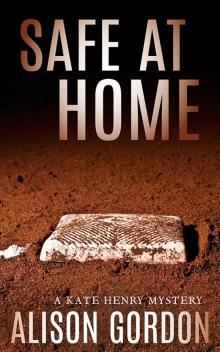 Safe at Home
Safe at Home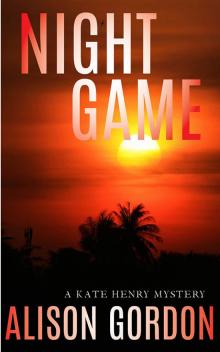 Night Game
Night Game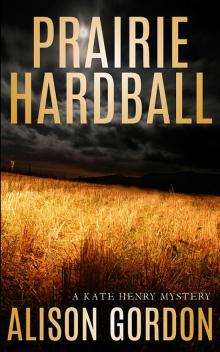 Prairie Hardball
Prairie Hardball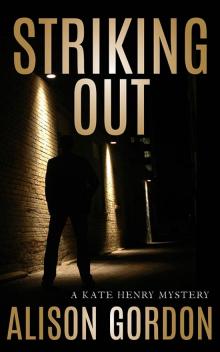 Striking Out
Striking Out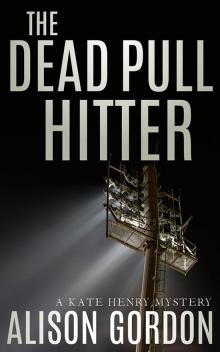 The Dead Pull Hitter
The Dead Pull Hitter